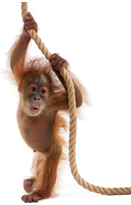题目内容
17.-Who do you have in mind for the position?-I think Peter is the most ______ person for it.( )
| A. | generous | B. | likely | C. | optimistic | D. | voluntary |
分析 -你认为谁可获得这个职位?
-我认为彼得是最有可能的人.
解答 答案B.
generous慷慨的,大方的;likely可能的,适合的;optimistic乐观的;voluntary自愿的,志愿的.根据上文的语境"Who do you have in mind for the position?"可知:说话人是在打听询问对方谁有可能得到这个职位,所以下文说"彼得是最有可能的人".故答案选B.
点评 本题考查形容词的用法.在熟知词义的基础上,再联系句子所表达的含义,从而选出正确的答案.

练习册系列答案
相关题目
7.George has promised Jane that upon her return he ______ for her at the airport.( )
| A. | will be waiting | B. | would have waited | ||
| C. | will have waited | D. | would be waiting |
5.-How beautiful the dress looks on you!Don't you want _______,Madam?
-Please show me _______.( )
-Please show me _______.( )
| A. | one; another | B. | it; another | C. | it; the other | D. | one; the other |
12.Unfortunately,the element Madam Curie devoted all her life her death.( )
| A. | to caused | B. | causing | C. | to be caused | D. | to causing |
2.The key word in the sentence has been ______,so it doesn't make any sense to us.( )
| A. | picked up | B. | left out | C. | held up | D. | made out |
20.---_____ I watch TV,I'll turn it down and never make any noise.
---Good.______ you are doing should never disturb others._______ how important you are,never forget about how others feel.( )
---Good.______ you are doing should never disturb others._______ how important you are,never forget about how others feel.( )
| A. | Whatever; Whenever; No matter | B. | Whenever; Whatever; No matter | ||
| C. | Whether; Whatever; 不填 | D. | No matter; Whenever; 不填 |
10.It's a shame to say it again,but I did tell a lie when _____ last time in my teacher's office.( )
| A. | having questioned | B. | to question | ||
| C. | questioned | D. | to be questioned |
 The orangutan (红毛猩猩),the most inactive of the great apes,has unusually stable DNA,too.Researchers have just completed the sequencing (序列) of the entire genome (基因组) of our orange-haired relative,and they have found to their surprise that its DNA has changed much less dramatically over time than has that of humans or chimpanzees."The orangutan is very unique,"says Devin Locke,a structural geneticist heading the orangutan sequencing project.
The orangutan (红毛猩猩),the most inactive of the great apes,has unusually stable DNA,too.Researchers have just completed the sequencing (序列) of the entire genome (基因组) of our orange-haired relative,and they have found to their surprise that its DNA has changed much less dramatically over time than has that of humans or chimpanzees."The orangutan is very unique,"says Devin Locke,a structural geneticist heading the orangutan sequencing project.